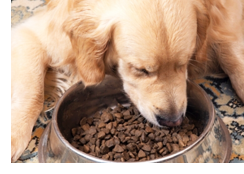
It’s estimated that up to 50% of dogs are overweight, and in many cases, their well-meaning owners may not actually realise they have an overweight dog!
Body condition scoring is a useful way of objectively assessing your pet’s weight through comparing them to a pictorial scale, such as this one from WSAVA.
If you compare your dog to the scale and feel they might be overweight, we’d recommend booking them in for further assessment, where we can advise on a safe, effective weight loss control program. In some cases, we may also suggest blood tests to rule out any medical cause of excessive weight gain, such as hypothyroidism or Cushings disease (hormonal imbalances that can slow your dog’s metabolism).
Weight loss diet
Unless your dog has any specific nutritional requirements (such as food intolerances), we recommend switching them to a prescription weight loss diet, given in strictly measured amounts as advised by us. These diets have higher levels of protein and fibre to promote feelings of fullness, and increased levels of nutrients to ensure your pet doesn’t develop any malnutrition (which can occur when restricted amounts of regular dog foods are fed).
It’s really important that we discuss any additional treats that you feed your pet – these will likely need to be reduced, and/or switched for lower calorie options!
Exercise
Depending on your dog’s current condition, and any potential underlying medical issues they may have, our vets can advise on a safe exercise routine for them. This can gradually be increased as your dog becomes more fit and mobile!
With weight-checks every two-to-four weeks, our Pet Doctors team can help support your dog’s safe and steady weight loss. Achieving their ideal weight will not only help them to feel healthier and more comfortable, but can also prolong their lifespan by up to one-to-two years! That’s off the scales!

